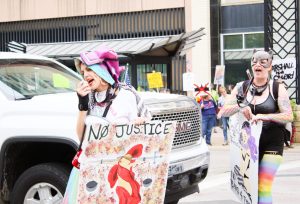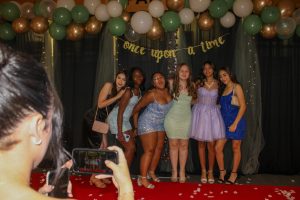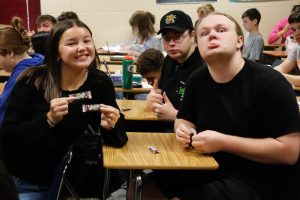Page 1: COVID-19 pandemic allows for personal growth
March 19, 2021
As the one year anniversary of Covid-19 quarantine approached, students reflected on how the pandemic has impacted their lives.
Freshmen Gillian Noffert and Jakob Tedrow took time to reevaluate their political beliefs in different ways.
“The process of changing my views happened during the Black Lives Matter uprising, after George Floyd was unjustly murdered,” Noffert wrote in an email. “I started to learn of the flaws of our country— such as its roots in white supremacy, heavy reliance on colonialist practices (even to this day!) and the bourgeoisie’s exploitation of the citizens.”
By educating herself through “smaller names who are committed to bluntly giving the facts” and social media sites such as TikTok, Noffert was able to form new opinions on societal issues and look at things from a different perspective.
“Pre-pandemic, I had only looked at things through one lens: my own, my parents’, or the news, failing to realize how these actions impact the country outside of myself, and the rest of the world,” she wrote. “The pandemic has really been a process of learning to come into myself as a person…. A moment to slow down and evaluate — which is exactly what quarantine allowed me to do — is what I needed.”
Tedrow’s stance “went from neutral to conservative” as a result of talk radio helping him choose a side of the political spectrum.
“At first, I was getting into talk radio and some conservative podcasts, but I hadn’t really established that it was being put to use, I was just hearing another side of the story,” Tedrow said. “But around the time the pandemic started, I started getting into more what I was seeing with cancel culture and just some of the bias that goes on in mainstream media, and I really started to notice the politics within everything.”
His views sharply contrast with Noffert’s and he considers conservatives to be the minority in some situations.
“In other situations, they’re the majority group, and that’s considered a problem,” Tedrow said. “Things like the term ‘systemic racism’ – I do think it exists, but I don’t think it’s a problem that’s causing issues that we’re dealing with today. I think it’s something we’ve dealt with and it’s really only a minor issue.”
Although neither student has been able to physically take part in politics because of the pandemic, both learned to advocate in their own ways.
“The hardest part for me was a type of impostor syndrome, as I wasn’t able to physically attend protests, so I could only work online,” Noffert said. “I’ve signed more petitions than I can count, volunteered with organizations throughout the US, and even read up on my political theory.”
Tedrow considers himself a “conservative underdog” and says he’s “willing to risk everything to be heard.”
“I’ve actually been thinking of whether I want to try to work with newspapers and other sites, just because I feel like at this point, there is not enough there,” he said. “So if I were to put myself there, not only would I basically be risking everything – because I’ve seen people get doxxed and shunned from society for their political beliefs – but I think at this point I’m willing to give it all up just to try.”
Other students have had a more humanitarian response to the pandemic.
Sophomores Toby Ivy and Ivy Lawrence both lost family members to COVID-19 and say it taught them to appreciate others in their lives.
“Oh God, yeah, that was difficult for everyone,” Ivy said. “It kind of made me realize I need to spend more time with the people that are still here because they could be gone any minute.”
Lawrence added: “It’s just made me appreciate life more.”
The loss of Ivy’s grandfather also made him more sensitive to those who don’t follow the guidelines put in place by the Center for Disease Control.
“Watching people who don’t do the things the CDC tells us to do makes me really upset because I’ve lost someone personally to it and seeing someone with their mask down halfway or not wearing it properly gets me upset,” he said. “Someone else like me could lose someone as important as their grandpa or one of their family members.”
Despite the tragedies they experienced, both Ivy and Lawrence agree with Noeffert in saying that the last year has allowed them to improve their mental health and do things they enjoy.
Lawrence was able to utilize the opportunity in order to learn to bake and play the ukulele.
“It’s really helped me relieve stress and keep my mind off of everything,” she said.
For Ivy and Noffert, it meant going through a process of self-reflection.
“It allowed me to reflect on a lot of situations and a lot of fights that have happened and realize I need to work better on myself and I need to have boundaries for myself and push people away when I don’t feel comfortable,” Ivy said. “During that time with myself, it helped me improve a lot and it helped me be a better person.”
Noffert added: “I’ve thrived in solitude, abandoning societal pressures, which lead to an immense amount of self-discovery, learning for myself and coming to my own conclusions… Overall, I’ve become more knowledgeable, confident and passionate over the pandemic.”





